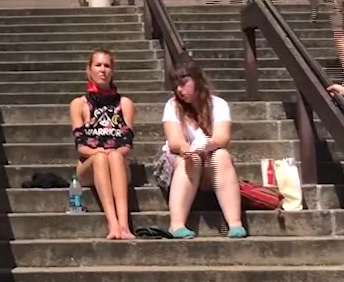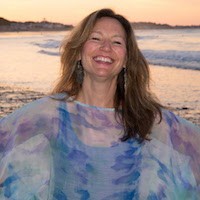Monika Rostvold wore pasties and a matched-her-skin thong bought at Target. She sat on the stairs in front of a library at the University of Texas library where she’s an undergraduate.
It was a performance piece she’d been considering doing for about a month.
During it, she had headphones on and red scarf around her eyes. She had talked with her friends, some professors and even her mom about doing it.
She’d researched Texas nudity law. She wanted to spark a conversation without breaking the law. She found out how naked one could get without technically breaking a nudity law.
It was not a protest, she claimed,but a performance piece.
When asked what inspired her she said:
“I was a survivor of being sexually assaulted. I don’t want to go in depth about my personal experience. It’s my body and I’m taking it back, my ownership of it. 1 in 4 girls have been sexually assaulted. It’s sad that it’s that common but it needs to be talked about. I just feel if we come together and express it. It’s o.k. to talk about this kind of stuff, it’s like an emotional outlet. For me personally, it’s hard to deal with when something like that happens to you. But, me—I have to express myself when it comes to anything. This is a way to express how I feel about this type of topic.”
She wanted to support women—herself and others. She invited everyone to think.
I fist-pumped the air in solidarity when I heard about Rotsvold speak about her performance piece and process. She wonders what the big deal is about women’s naked bodies. She wonders why our bodies are so objectified and sexualized.
It’s a topic she takes on in her art when she has men pose in what are considered feminine postures.
In her own artist statement, she writes: “Being a female artist its hard not to recognize how overly sexualized women are in societies culture. Pop culture, as a young girl, told me how to be a seductive woman. While, Personal experiences lead me to question ideas about sensuality. My vibrant color scheme and contemporary subject matter I deconstruct what is socially considered sexy.”
(Check out her art. She’s been thinking about these issues for a while.)
She revealed her own naked form sans the objectification and sexualization. She chose to be in public with wearing virtually the same amount of nudity as shown by women in ads or music videos.
She wondered how people would react and how she’d feel in public, basically nude, by her own choice.
She said she had to get in her body and in a meditative state to deal with the fear and discomfort and heart-pounding she felt.
I can’t stop thinking about it. She said it was meant to spark conversation. It did. I’ve been have non-stop conversations with my own damn self for days.
What is sexuality?
What is empowerment?
When it comes to nudity, who gets to say how much skin is shown or what is beautiful, legal and socially acceptable?
I wonder what would have happened if this was done by a woman of color, a woman at 60, a variety of men? It would be interesting to film and compare those scenarios too.
I love her direct involvement with and engagement in community. It keeps questions less distant and abstract and philosophical. She wasn’t just talking in a dorm room at two a.m. (though that’s fabulous too)…she was living out her questions.
By using her own body in art and performance she made think and feel new things about the way is which women are objectified and sexualized. She made politics and arts not by “using” her body but by being in her body as she chose to be.
She said it wasn’t a protest and I get and respect that, but it was still political in the way the feminist dictum states that the personal is political. Personal-political to me includes writing, art and how we live and inhabit our skin.
Her piece makes me wonder how I’d have regarded her on the stairs. Would I think she’s brave, wild, crazy or maybe even cold or on drugs? Would I have stood watching, cheered, asked if she was okay?
How would I feel doing the same thing? Empowered? Vulnerable? Ashamed?
I don’t want to try this experiment but I want to push myself more.
When not making art, how do I live?
I want to consider my own life history and assumptions with fresh insights.
When did I lose my body? When did I reclaim it exactly? When did my body become a thing, an object and a container that could be lost or reclaimed?
It’s not until my 40’s that I felt—feel—fully inhabited in my body, skin and self. And that does wonderful things for feeling free and empowered in and out of the bedroom. It changes the way I work and live and feel.
Why did it take that long? What would it have been life to feel inhabited for my entire life? Does any girl or woman feel that from birth to death?
When did I start to stand outside of myself and see myself as I appear to others? Why was it a journey to return home to the body? Where had I been? Why had I gone outside?
When did I start selecting jewelry or make-up for the benefit of others? And when did I stop?
When did I start feeling my body as something providing sexual pleasure or release to others and when did I stop?
Do men feel an awareness of how they are seen, viewed and considered by others? Do they comment and notice the appearance of other men the way I do, and contrast and compare? In bed, do they give themselves away to please a partner?
Do I do it because I was just trying to live the best I could after power was stolen from me, in the robbery that is child sexual abuse, before feeling healed?
Was it from growing up on so many images of my female form as a commercial product used to sell—well—everything?
I’m sure it’s both and more.
When did my own eyes start viewing my own self as other? Is this a result of being sexualized by society?
Sexual violence is far too common for women. Was this always so? Rotsvold did this piece, in part, as a response to the sexual violence she and many of her friends have experienced. And as a result another student set up a Facebook support page at the University of Texas for survivors.
Art. Politics. Personal experience.
I’m inspired to see how each is a paint color and she helped them blend into a beautiful portrait towards change. And community. And conversation.
I love people, students, artists and those who challenge my heart, mind and social concepts.
I love the bold, creative, brave and political too.
It’s the ones who insist on questioning even without answers that keep big undercurrent conversation going.
I love what a performance piece can start and help spread and how I walk around now a little bit more curious and aware.
I feel the questions in my skin and my gut and the way I carry myself. I start to notice when and how often I objectify other women. And myself. Do I notice and comment on how my friends look, dress, adorn and why exactly?
Are these compliments or a shift of focus from more important issues? Do compliments contribute to the “that’s what matters most about you” emphasis on appearance? Is that what I want to be emphasizing?
Do I compliment men as often on the shirts they wear, the watches or shoes or new hair styles? Sometimes but not nearly as often, no as routine or custom or typical conversation. Why?
Do men notice and comment on each other?
Questions and more questions. See how Rotsvold’s piece invited me to ask myself a million questions?
Do men look in a mirror and wonder how they appear? Or, do they feel themselves in the head, as the eyes looking at a reflection? When did my eyes look on at myself instead of from inside of myself?
Do all women feel this? Is this a result of violence after the body becomes not only sanctuary, temple and life force but scene of the crime when violated?
I can’t help but wonder.
Questions. Big ones. Little ones. Personal ones. Societal ones.
I’m questioning my own self and assumptions and choices too – how I interact with others.
I don’t have answers or an agenda but that doesn’t mean it’s not political or important or change-making.
Monika Rostvold wanted to start conversation.
Done.
P.S. This piece is part of my own writer social experiment. I’ve noticed that articles with nudity in the title get read FAR MORE often than any others. Since writers get paid based on reads, it matters. I wanted to see if my own writing would get read differently if the topic is nudity and if I could write about in a way still true for me. We’ll see. I’m fascinated and curious. I know sex sells. That’s not news. And nudity too. Bu why exactly and when it’s presented only in certain ways. Does male nudity sell? Does nudity sell when non-sexualized? I love questions and the freedom here to experiment. I’ll make a comment in a month.
Author: Christine “Cissy” White
Editor: Renée Picard
Image: Screenshot







Read 0 comments and reply